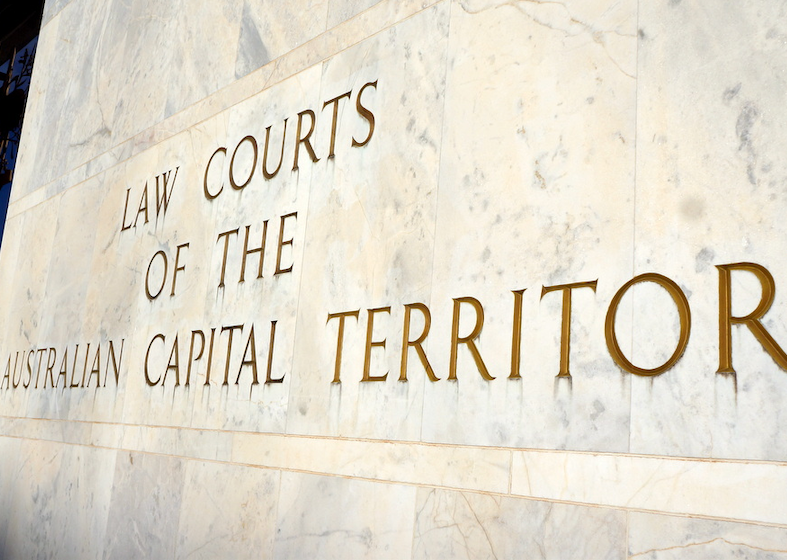
Legal columnist HUGH SELBY responds to a reader concerned there are matters coming before ACT magistrates relating to alleged law breaches that happened more than one year ago. Too late to be heard? Maybe, says Selby, and here’s why…
Readers of CityNews can liven up a day. For that I am ever so grateful.

Sometimes reader outrage, real or confected, leads to demands that an article be “removed” or edited so that it better conforms with the complainant’s values or interests.
To such demands our editor and we writers must pay close attention. Has some important fact or matter of policy been overlooked, misstated or misunderstood? Has some naked prejudice blinded us, the complainant, or both to the bleeding obvious?
Sometimes a reader draws attention to some small incident, even the meaning of a phrase, seemingly of interest only to them until – upon a closer look – what lies beneath turns out to be interesting for us all.
And that’s what happened today. That in turn explains this article in which the obvious is anything but.
Imagine that there is a post-election party. In the wee hours you are telephoned from a police station where your sloshed or drug-affected friend or relative, having been arrested, now released on bail by the watchhouse sergeant, wants you to get out of your pjs, put on some clothes and come and get her or him.
Too sleepy to say what you think about this affair, but happy it is mid-spring and not mid- winter, you instead act with love and compassion and go to the police station where she or he is waiting with a notice to attend court for the charge/s listed on the notice on a date in the not too distant future.
Driving away the careless thought crosses your mind: “There’s been an arrest, a release on bail and the serving of a piece of paper with charges and court date. How is this described? Has the prosecution begun? Have the proceedings begun? Is there a difference?”
While she or he noisily sleeps it off on your lounge you sleepily scroll through the online news late morning while you sip black caffeine. There’s a report that other people at that party were also arrested, but they were not released by the police. They were taken to court mid-morning where a magistrate gave them bail. There was a prosecutor in that court. Bail was not opposed, but some conditions were imposed on each defendant. They too have bits of paper laying out the charges they face and the next court date.
This reminds you of those silly questions you posed to yourself pre-dawn. These people have been before a judicial officer in a courtroom, with a prosecutor present. Does that affect the answer to the question: has their prosecution begun, or is it just the proceedings that have begun?
Who cares about the answer? Anyone who is going to our Magistrate’s Court to defend any criminal matter (such as driving, parking, littering, graffiti, minor assaults or theft) is very interested. There may or may not be a legal escape route – a little technicality now unmasked.
Here’s why. For the offences, known as summary offences, which are heard in a Magistrates Court (or Local) Court in NSW – where the majority of criminal matters are heard – legislation provides a time limit for the prosecution or proceedings to begin.
The time limit is six or 12 months, depending upon whether the case is being brought by the Commonwealth, a state or a territory,
In NSW the Criminal Procedure Act provides:
179 Time limit for commencement of summary proceedings
- Proceedings for a summary offence must be commenced not later than 6 months from when the offence was alleged to have been committed.
That’s understood to mean that charge/s must be laid within that six months. Charges are laid by police. Nevertheless, that’s interpreted as the proceedings begin with the charge.
This may reflect the fact that in NSW it is police prosecutors who act for the state in the Local Court; that is, the continuity of police oversight from initial charge means that these are proceedings brought by police from charge to court outcome.
The ACT’s Legislation Act takes a different approach both as to time and language. For summary offences it provides in s 192 that:
“(2) A prosecution… against an ACT law must be begun not later than—
(a) 1 year after the day of commission of the offence; or
(b) if an ACT law provides for another period – that period.”
The Dictionary to the Legislation Act does not define either “prosecution” or “begun”.
There is nothing about time limits in other relevant ACT law such as the Magistrates Court Act, Crimes Act, or Criminal Code.
(Similar language – but with a two year period – is used, for example, in our Biosecurity Legislation Amendment Act, which provides in section 204A(2) that, “(2) A prosecution for the offence must be begun not later than 2 years after the day the offence is committed.”)
Recalling the questions first asked pre-dawn and then late morning, what does the ACT provision mean?
We do not have police prosecutors. Our prosecutors work for the ODPP, an office that is independent and sometimes critical of police.
The ODPP does not become involved in a case (save in exceptional cases, such as the Lehrmann prosecution in the Supreme Court) until the police deliver the brief, that being any witness statements, copies of any warrant, notebook entries, photos, etcetera to the ODPP.
Our DPP Act in section 6 sets out the functions of the Director:
(c) in relation to summary offences:
(i) instituting prosecutions;
(ii) conducting prosecutions, whether instituted by the director or not.
Note that the police have no decision making role in this process. From this it can be argued that everything done by police in the ACT, prior to the ODPP deciding to run a case (after reviewing the brief from police), is not a prosecution.
Recalling the earlier description of an ACT prosecutor appearing at a bail hearing, that – on first and later reflection – does not seem to amount to “instituting prosecutions”.
Doesn’t it follow then that here in the ACT, unlike in NSW, the relevant time limit both for the police to charge a defendant and then for the ODPP to bring them before the Magistrates court, is 12 months?
Note that “to bring before a court” is not the same as having a final hearing. There is no right to a speedy trial in Australia. That said, who (apart from those on elective surgery waiting lists) would think that 12 months was speedy?
There can be compliance with the ACT provision by a charge being laid, and first mention in court, on day 364 after the alleged offence occurred.
Words have meaning. “Proceeding” does not have the same meaning as “Prosecution”.
The use of particular words in a statute is taken to be deliberate. Hence, if the ACT law makers wanted police to charge within one year (that being twice the period required in Yass or Queanbeyan), but they were unconcerned about when it came to court, then they could have followed the NSW wording.
But our lawmakers have chosen not only to use the term “prosecution” in the Legislation Act, but to be clear about the function of the DPP in the DPP Act.
What all of this might mean is that there are matters now coming before our magistrates that relate to alleged law breaches more than one year ago. For a variety of administrative reasons next week or thereafter may be the first occasion on which it is clear that the DPP has instituted proceedings.
Some defendants may have an early Christmas. It may be impossible to prosecute them. Let’s wait and see. There’s always the prospect that this little matter of the meaning of words has been resolved by an unreported decision, known and held close by those who need to know.
Hugh Selby, a former barrister, is the CityNews legal affairs commentator. His free podcasts on “Witness Essentials” and “Advocacy in court: preparation and performance” can be heard on the best known podcast sites.
Who can be trusted?
In a world of spin and confusion, there’s never been a more important time to support independent journalism in Canberra.
If you trust our work online and want to enforce the power of independent voices, I invite you to make a small contribution.
Every dollar of support is invested back into our journalism to help keep citynews.com.au strong and free.
Thank you,
Ian Meikle, editor





Leave a Reply